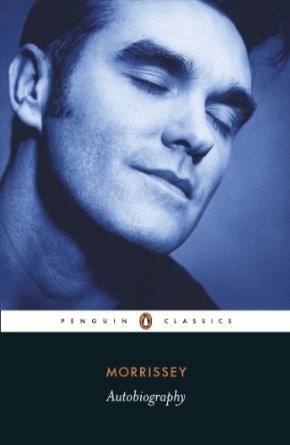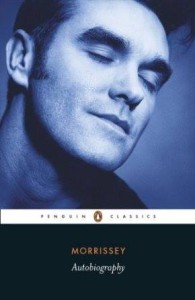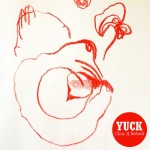“At a crofted fairground on Stretford Road the sights and sounds and smells are alive with harm and hellborn pleasures.”
As befits the finest lyricist of his generation, Morrissey can certainly write. The opening third of Autobiography is an utterly masterful evocation of northern England in the 1970s, all derelict houses, ominous Victorian edifices and fairground violence, from which an adolescent Morrissey retreats into the world of pop music, via the famous (Bowie, T-Rex, Roxy Music) the cultish (Sparks, New York Dolls) and the utterly obscure – it’s not hard to imagine today’s sensitive teenagers holding onto a copy of the book with one hand, as to a lifebuoy, while using the other to scour Youtube for Buffy Sainte-Marie, Timi Yuro or Jobriath.
Morrissey’s kinship with the benighted working class folk around him, suffering at every age, be it the brutalized children in the Victorian schools or the elderly kicked out of their beloved terraces and moved into tower blocks, pours from these pages the way it would later pour out of songs such as Jeane, Hand in Glove and The Headmaster Ritual. His anger on their behalf still burns 40 years on. As does, clearly, his urge to be a music journalist; he still writes about music more powerfully than most contemporary music journos (Roxy’s Virginia Plain is perfectly described as “a pursed-mouth whirl of low noise and words used for sound only”).
But just when you’re becoming convinced that Autobiography’s much-mocked status as a Penguin Classic is fully deserved, a second, less likeable voice takes over – Morrissey the pop star. And just as the narrative reaches the era most readers are itching to read about, we we we becomes me me me, and the story of The Smiths is treated simply as a brief prelude to the main act. We should have guessed this from the teenage Mozzer’s observations when watching Top of the Pops back in the 1970s:
“My eyes and ears are caught only by the solo singers…there are no cuts to blandly smiling session-players when all we want to see is the sculptured singer, alone carrying all…”
And so the story of this sainted band, told for the first time by one of those responsible for its existence, takes up a mere 70 pages, with the emphasis on record company shenanigans rather than on the songs, the lyrics, the gigs, the five-year whirlwind that reshaped the landscape. Morrissey briefly praises his bandmates, particularly the brilliant Marr (“In the full vigour of his greatness…a deluge of ideas and motion”), but spends more time moaning about an alleged lack of airplay and press coverage. Presumably he never opened a newspaper or turned on the radio during this time, for in my memories the band are inescapable.
The Smiths’ sudden demise is glossed over perfunctorily, and we move onto the main course (I would say “meat” but it seems inappropriate) – Morrissey as the sculptured singer, alone carrying all. Again we get zero insight into the songs themselves, their inspiration, their meaning, their creation – unlike his childhood self, Morrissey the man is very much a closed book and anyone coming to Autobiography to get the dirt, or least the dirt on Morrissey himself, is going to be disappointed. A cast of celebrities pop round to his flat for tea – Peter Wyngarde, Vanessa Redgrave, Sandie Shaw, Alan Bennett, some of them more welcome than others; his solo work goes from the ridiculous (Kill Uncle) to the self-appointedly sublime (Vauxhall & I); and the NME attempt to portray him as a racist – an almost certainly ridiculous claim, though Morrissey rather conveniently omits any mention of the songs Bengali in Platforms and Asian Rut, as well as his infamous “All reggae is vile” statement.
The lack of an editor, or at least one prepared to rein in their subject’s monstrous narcissism and persecution complex, is evinced by over 50 brain-numbingly tedious pages dealing with the Mike Joyce royalties case, out of which no one – the venal Joyce himself, the non-committal Marr, the mumbling Rourke, the hated Justice John Weeks, and the rambling author himself – emerges in a good light, least of all Penguin themselves for allowing their writer to bang on confusedly at such length. If one good thing comes from this section, it should be the end of those Smiths reunion rumours – the very idea of Morrissey reuniting with the apparently feckless Marr and the treasonous rhythm section (“like twin pugs with matching flea collars, Rourke and Joyce were poor company even to each other”) now seems even more unthinkable than ever.
Financially (and possibly mentally) ruined by the British legal system, our hero decamps to Los Angeles where, after several years of doing not very much, he begins recording again, thus beginning the final, and most self-indulgent, section of Autobiography – Moz Breaks America. Page after page of sales figures, chart positions, and sold out gigs in front of berserk, screaming fans, yet the persecution complex remains as strong as ever through it all, and you’re left with the rather sad picture of a man wishing he could be taken as seriously as Bowie, Walker or Cave, yet still pathologically addicted to the screaming, the tearing of silk, the limo escape.
But Morrissey just can’t help himself. He knows he gets up the public’s nose, but considers it his life’s work. “Spare a thought for those who rock the boat” he begs. “They challenge your attention, and even in your rage you find you quite like them for poking at you as if you were a dead mule”, before destroying any possible sympathy by adding “Perhaps you are?” Later: “Well, yes, of course I’m a bit much – if I weren’t, I would not be lit up by so many lights.” Golden lights, it’s a terrible shame…why did you change?
And so, the last of the great British pop stars reveals a little of his younger self, and then goes on to highlight just why he will never achieve the National Treasure status he so obviously craves. He’s too contrary, too defensive, too lacking in confidence to open up, or even to record the kind of music he wants to make – it remains scarcely believable that an aesthete such as Morrissey continues to record mostly run-of-the-mill indie rock backed by workmanlike “session-players”, yet he sheds no light on why this should be. And the real tragedy exposed by Autobiography is that, despite decades of speculation, he probably doesn’t have a great book in him either. Like the man himself, it is touched as much by paranoia, lack of self-confidence and bitchiness as it is by genius. Those who already dislike him probably won’t read it; those who do like him will read it and like him a little less.
[Rating:3]





